






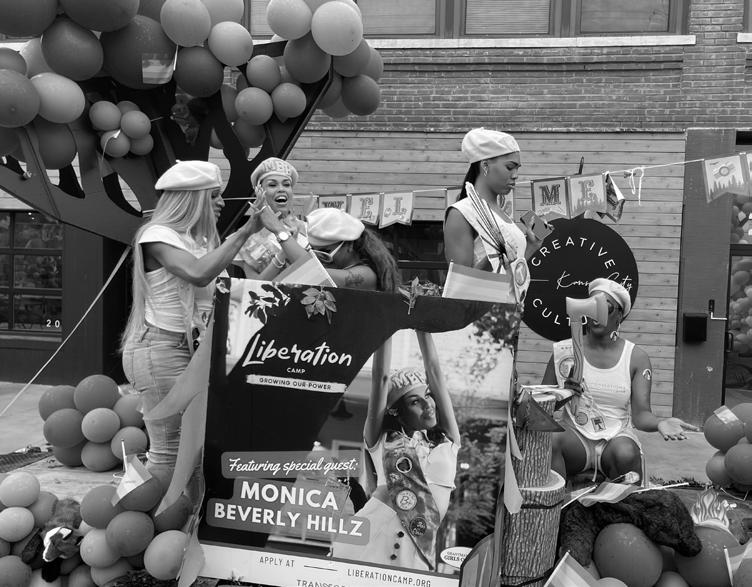


THEY BOLDLY CLIMB BOULDERS PAGE 27
FROM COMO TO BROADWAY PAGE 9
THE TROUBLE WITH CASH BAIL PAGE 18
ALL THE PASTA YOU WANT PAGE 25
SURE,
AT FIRST I WAS A LITTLE TAKEN ABACK BY THE WHOLE PEEING STANDING UP THING. BUT I TAUGHT HIM TO THROW A STICK AND NOW HANGING OUT WITH HIM IS THE BEST PART OF MY DAY.

— EINSTEIN adopted 12-09-10
EFFORT TO LEARN
When you’re from a tiny country like Armenia, you pretty quickly learn to flag people who haven’t heard of your home. When I was 17 living in Oregon, it took me about two months to identify the four telling signs: a slow nod, raised eyebrows, polite smile and a surprised “hmm.” Depending on my mood, I would 1) change the topic, 2) share a fun fact about my home or 3) “torture” the person with a how-dare-you look.
But deep down, I was angry. I used to get frustrated that people couldn’t find my country on the map or weren’t aware of the ongoing attacks there.
As I got older, my anger waned. Not because everyone suddenly knew everything about Armenia, but because I realized I didn’t know much about other things. Up until a couple of weeks ago, my knowledge about the bail system (p. 18) was limited to bounty hunter comedies. I didn’t understand trans history or experiences of trans women of color (p. 12). I couldn’t tell the difference between climbing and bouldering (p. 27).


It takes effort and intention to learn about experiences that are not our own. We might be embarrassed to ask questions and show our ignorance. We might not even realize what knowledge we lack. I feel lucky that as a journalist my mission is not only to educate myself on new topics but also to share that with others.
While lack of knowledge worries me, absence of curiosity and care terrifies me. About one in six Americans say they opt out of news consumption because of overwhelming amounts of information, according to a 2020 Knight Foundation study. That negatively affects civic and political engagement. A society that doesn’t care about what’s happening beyond its bubble is dangerous.
Contrary to this trend, our November feature stories highlight people who care. People who got involved with issues that might not affect them. People who formed brave communities of support. And although younger me was endlessly frustrated by the awareness gap, grown-up me hopes that stories like these will inspire us all to build bridges across these gaps, not put up walls.

Kristina Abovyan
Editor-in-Chief
ASSOCIATE EDITORS
CULTURE MEGHAN LEE, MARJAI NEAL, SAM WILLS
EAT + DRINK MARA DUMITRU, MICHAEL SAPP CITY LIFE MJ MONTGOMERY, RICKY SCHODL, JANE STEINBRECHER
STAFF WRITERS SAM BARRETT, LEVI CASE, KARA
ELLIS, ATHENA FOSLER-BRAZIL, JONAH FOSTER, SETH HADLOW, SOPHIA KOCH, CHLOE LYKKEN, ANDREA MERRITT, GRACE PANKEY, ABIGAIL RAMIREZ, MADDIE SHANNON, MARY RUTH TAYLOR, ELENA WILSON
SOCIAL & AUDIENCE AYSIA GREY, NICK GLADNEY, GILLIAN KOPTIK, JOSH MARGHERITA
DIGITAL PRODUCERS ETHAN DAVIS, KIANA
FERNANDES, JULIE FREIJAT, NICK GLADNEY, EMILY
ANNE GRIFFITH, JULIEN JENSEN
CONTRIBUTING WRITERS OLIVIA MAILLET, KHALIA
SMITH, NICOLE VOSS, EGAN WARD, CAYLI YANAGIDA
ART ASSISTANTS MEGHAN ASLIN, QUINCY
HAYMART, RICKY SCHODL, THEO JOHNSON
M ULTI MEDIA ASSISTANT JULIA WILLIAMS
EDITORIAL DIRECTOR HEATHER ISHERWOOD
EXECUTIVE EDITOR LAURA HECK
SENIOR EDITORS CARY LITTLEJOHN, JENNIFER ROWE

Behind the issue
The feature story about bail and Fair Shake Flowers (p.18) details the broken and unjust bail system. For our design, I wanted to convey this serious idea through flower imagery — but not sunshiney, bright imagery. I created the effect by scanning flowers on our newsroom printer and moving them along the glass. It presents the blooms in a dark, distorted way similar to the way the bail system presents itself as working, but in reality is broken. —Ava


3
VOX MAGAZINE • NOVEMBER 2023
Photography by Campbell Biemiller, Megan Sundberg and Canon iR-ADV C5550/5560
Horton
ADVERTISING 882-5714 | CIRCULATION 882-5700 | EDITORIAL 884-6432 Vox Magazine @VoxMag @VoxMagazine @VoxMagazine CALENDAR send to vox@missouri.edu or submit via online form at voxmagazine.com WANT TO BE IN-THE-KNOW? Sign up to receive Vox ’s weekly newsletter, the “Vox Insider.” We’ll tell you how to fill up your weekend social calendar and keep ahead of the trends. Sign up at voxmagazine.com. FOLLOW US NOVEMBER 2023 VOLUME 25, ISSUE 8 PUBLISHED BY THE COLUMBIA MISSOURIAN LEE HILLS HALL, COLUMBIA MO 65211 Cover design: Campbell Biemiller Photography by and courtesy of: Baxter Stein, Bailey Stover, Transformations and flickr/Jim Fouratt EDITOR-IN-CHIEF KRISTINA ABOVYAN MANAGING EDITOR GRACE KENYON DEPUTY EDITOR MICAH BARNES DIGITAL MANAGING EDITOR MAE BRUCE AUDIENCE ENGAGEMENT EDITOR DAVID TALLANT ART DIRECTORS CAMPBELL BIEMILLER, AVA HORTON PHOTO DIRECTOR LILY DOZIER
EDITOR DOMINIQUE HODGE
MULTIMEDIA

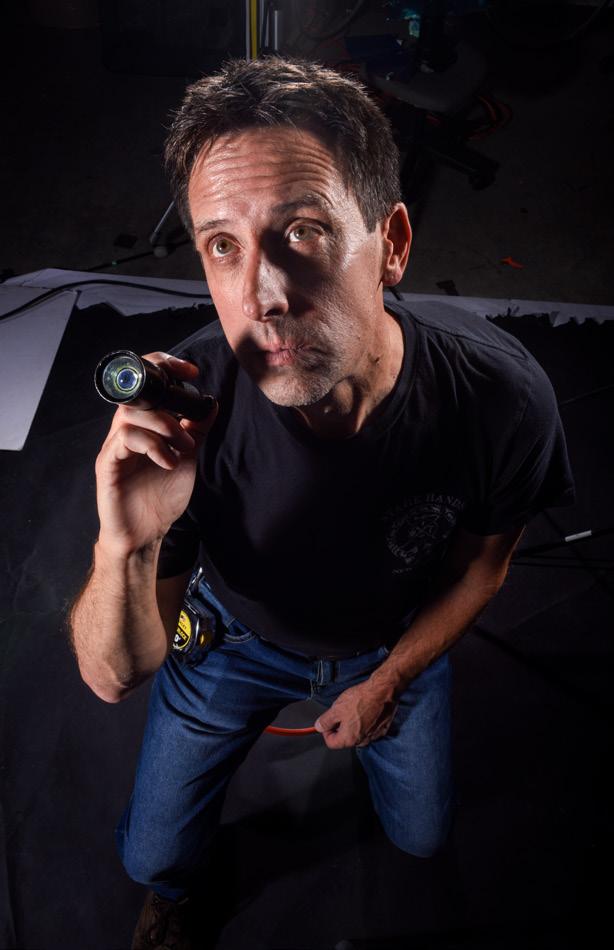



4
VOX MAGAZINE • NOVEMBER 2023 27 25 TABLE OF CONTENTS 12 9 IN THE LOOP 05 Columbia’s cycle-pedia Want to bike to work or school? Here are some tips for a successful commute. 07 Vox Picks
Swift’s eras or experimental music? Let us help you decide. 08 Portrait of a foodie
with her
CULTURE 09 Broadway to Broadway Columbia’s Paul Wimmer takes his carpentry to New York City theaters. 11 Walk in The Park Meet the band bringing a new sound — and a trumpet — to the local scene. FEATURES 12 The fight for liberation Merrique Jenson founded a nonprofit that supports the transgender community. 18 Movement against bail A booth selling flowers spreads awareness of the inequity of cash bail. EAT + DRINK 23 More on their plate Delia’s adds personal touches to the Mexican restaurant’s Stadium location. 25 Into the pasta-verse Pop-up Molto Pastificio uses traditional tools to create a plethora of pasta. CITY LIFE 27 Partners in climb Boulderers climb without ropes, but not without the support of each other. 18
Photography by Ava Horton, Reid Jackson, Baxter Stein, Cam Medrano and Sharon Quintana Ortiz
Taylor
Kerri Linder highlights Columbia’s diverse cuisine
book.

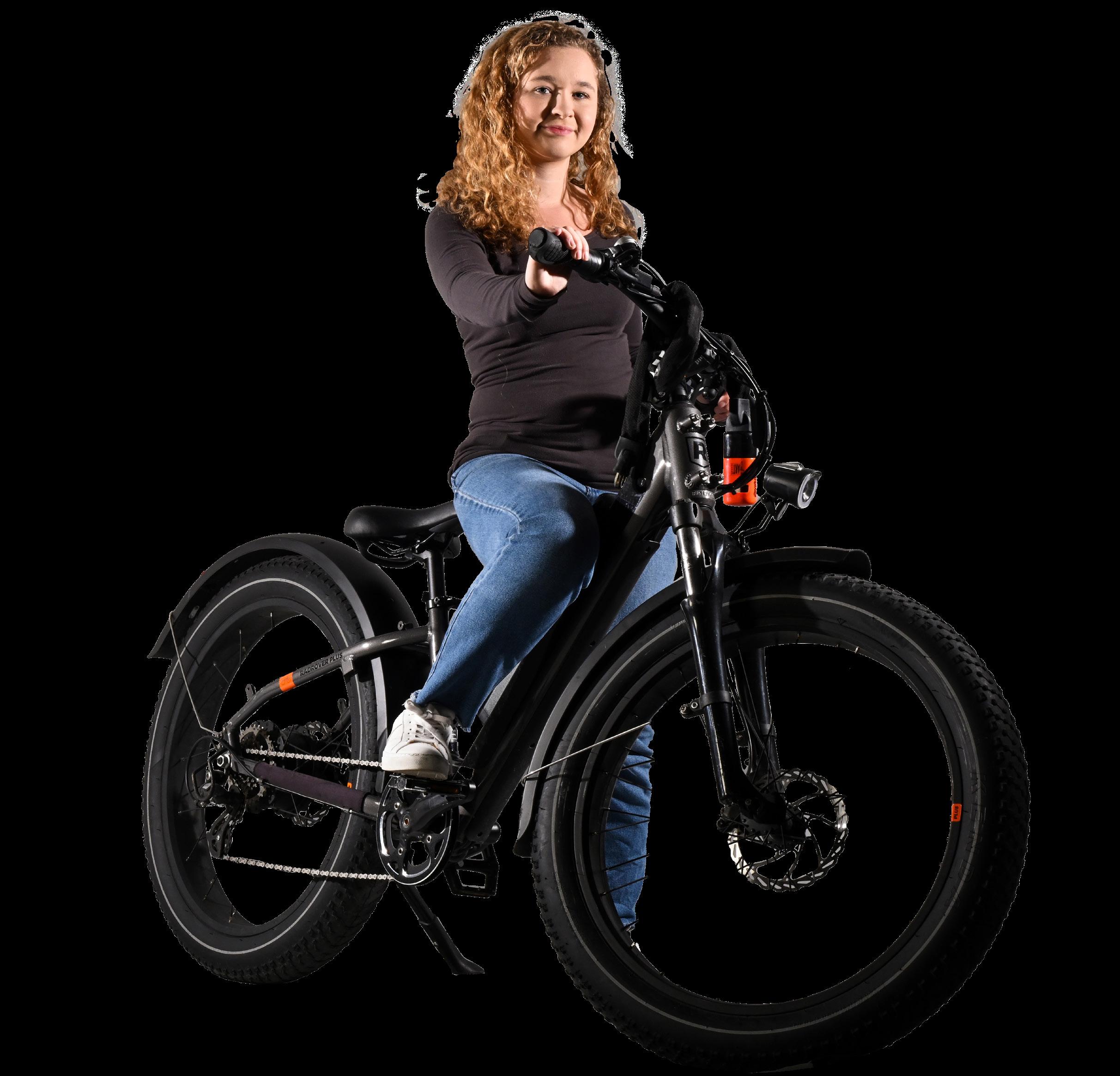

Columbia’s cycle-pedia
What to know before hitting the daily commute on a bike.
BY SETH HADLOW
Biking to work can be a good source of exercise, reduce your emissions and beat traffic. Considering that the U.S. Department of Transportation reported in 2018 that over 60% of car trips were 6 miles or less, biking is a viable option. But before you hit the road, there are a few important factors to understand.
Types of bikes
Choosing the right bike is the first step in planning your new commute. Sam Botts, a sales associate at Walt’s Bike Shop, says he asks customers what surfaces they want to ride on, and if they want an upright position or a more leaned-forward position to personalize
brid bike, which he calls the Swiss Army knife of bikes, to manage multiple types of terrain. Many of Columbia’s trails are crushed limestone (a hard, dusty surface) while the MKT Nature and Fitness Trail is paved. Electric bikes — often called e-bikes — are also a good option for commuting. Taylor Gill is a Columbia resident and frequent e-bike commuter. She likes the e-bike because it’s faster than a typical bike while still being more environmentally conscious. One person riding an e-bike can reduce carbon dioxide
5
VOX MAGAZINE •NOVEMBER 2023
Photography by Kate Cassady and courtesy of Unsplash and Arcadia Publishing
Taylor Gill uses her e-bike to commute around Columbia.
emissions by nearly 500 pounds annually, according to a 2020 ScienceDirect article. “A lot of die-hard commuters in their late 30s and older, may commute (using an e-bike) just to make it easier or to arrive at your job not an absolute sweaty mess,” Botts says.
Local businesses such as CycleX or Walt’s Bike Shop provide a variety of options for a new bicycle. Botts says that hybrid bikes begin around $600 and e-bikes start at $1,900.
Helmet on!
Another important factor in biking is knowledge of the roads and trails. A map can help you plan a route that’s efficient and bike friendly. Websites like bikemap. net are good source for bikers to plan out their rides. The nonprofit group Local Motion is another good resource that provides policy solutions, data and resources on local transportation.
There are about 77 miles of onstreet bike lanes in Columbia, according to the city. By comparison, there are
1,450 miles of paved roads for vehicles. Gabi Jacobs, the Local Motion community engagement coordinator, tries to ride on side streets whenever possible. Once she reaches downtown, she feels more comfortable biking with cars. “Usually traffic’s not moving faster than 20 mph,” she says.
Lawrence Simonson, CEO of Local Motion, agrees. “The hope is in an area like The District, that the travel lanes for automobiles are going at such a speed that it’s relatively safe for people biking to be on the roadway,” he says.
When biking outside of a protected lane, cyclists must be wary of oncoming traffic. Botts recommends having a defensive attitude toward other traffic, operating under the assumption that they could enter your space.
Getting into gear
When it comes to commuting, you’ll need more than just a bike. Lights, helmets and panniers (bags that attach to the side of a bike) are all necessary
JUST LIKE RIDING A BIKE
Walt’s Bike Shop
Walt’s offers service, gear, new and used bikes as well as community events. It carries all types of bikes including e-bikes.
1217 Rogers St., 886-9258
CycleX
Looking to serve everyone from the advanced gravel rider to the novice, CycleX offers new and used bikes, a service center and community cycling events.
203 N. Providence Road, 874-7044
equipment to make it safer and easier.
Jacobs emphasizes the importance of wearing protective gear, like helmets with reflective strips to keep riders visible. Side mirrors allow riders to stay aware of their surroundings.
Bike lights are also important so drivers can see you, especially at night, she says.
The National Highway Traffic Safety Administration recommends measuring your head to find a helmet that fits. Also, there should also be room for just two fingers between your chin and the strap. Try helmets on before choosing one and look for one that reduces the risk of brain injury. Helmets should be replaced after a collision.
Bags are the last necessity. Panniers offer easy mounting via the brackets that are on most bikes and come in a range of sizes. Think about factors such as the number of openings on the bags, which can affect a pack’s water resistance and ability to shield your belongings from the elements.

6 IN THE LOOP
VOX MAGAZINE •NOVEMBER 2023
TRANSPORTATION
Vox Picks for NOVEMBER
Each month, Vox curates a list of can’t-miss shops, eats, reads and experiences. We find the new, trending or underrated to help you enjoy the best our city has to offer.
BY MADELINE SHANNON

LEARN about Indigenous farming techniques in Missouri at the Columbia Farmers Market. The event is part of the market’s free kids’ activities, which include both crafts and educational programming on Saturdays in the One-Room Schoolhouse at Columbia’s Agriculture Park. Bring a coat and your curiosity to learn about Indigenous Missourian farming practices. Nov. 11, 9 a.m. to noon, Columbia’s Agriculture Park, free


SHAKE IT OFF and keep your Swiftie energy up after the Taylor Swift: The Eras Tour movie by dancing the night away at The Blue Note’s Taylor Swift Night. Bask in the cruel summer afterglow, come for the karma and live out your wildest dreams. The Columbia event is part of The Taylor Party organization that operates dance nights nationwide. Brian Howe manages close to 20 DJs that put on the shows. “I figured we’ll only do four or five (shows) and it’ll be fun and then we’ll just move on to the next idea,” Howe says. “We’ve done a lot more than four or five of these now.” You might even see a few of CoMo’s biggest Swifties featured in our story at voxmagazine.com. Nov. 10, 9 p.m., The Blue Note, $15-$35, thebluenote.com
LISTEN to the eclectic musical mix of the Columbia Experimental Music Festival, which is in its eighth and final year. The artist-run record label Dismal Niche Arts organizes the festival, which this year includes acts such as The Sun Ra Arkestra, Rome Streetz, The James Brand Lewis Trio, claire rousay and SUMAC. Dismal Niche wrote in an email to its subscribers that rising costs made the festival unsustainable in the future. Stroll downtown Thursday through Sunday the first weekend in November to experience performances from a wide range of experimental musicians from all over the country. Many of the shows are expected to sell out. Nov. 2-5, $20 for most shows, dismalniche.com/cemf
READ local writer Marlene Lee’s latest work, Inner Passage: Collected Short Stories Skylark Bookshop is hosting a release party for the book. The collection of short stories explores human nature and is told from the perspectives of characters from across the country, “whose lives lead them toward truths they ignore, resist and explore — sometimes all at the same time,” according to Skylark’s website. Lee has two novels under her belt that reflect on the past. She will talk about the book and sign copies. Nov. 14, 6:30 p.m., Skylark Bookshop, free, skylarkbookshop.com/new-events


STAY TUNED for Penguin Piano Bar and Nightclub’s grand reopening. It opened in 2004, hosting pianists playing the crowd’s requests, including perennial faves “Wagon Wheel” and “Sweet Caroline.” Three years after the popular night spot closed amid the pandemic, its Facebook page posted a photo of its iconic penguin logo saying, “SHHHH... 2024.” Its website says the still hush-hush reopening will include newly renovated facilities and a full-service restaurant. Spring 2024, 1025 E. Broadway, penguincomo.com

7
IN THE LOOP VOX PICKS VOX MAGAZINE • NOVEMBER 2023
Photography by Cara Penquite and courtesy of Adobe Stock: Maks Narodenko, Eric Isselée and New Africa
Portrait of a foodie
Kerri Linder, an accountant turned food entrepreneur, shines a light on Columbia’s diverse cuisine.
BY ABIGAIL RAMIREZ
Kerri Linder is a lifelong foodie, but she didn’t pursue that passion right away. She earned a degree in accounting from MU and became a certified public accountant. But as someone who grew up in Columbia, she has long enjoyed exploring local restaurants and experimenting with food.
After a trip to Charleston, South Carolina, which included a food tour, Linder knew that her heart was in the food industry. In 2014, she created Columbia Culinary Tours, which brings people together to taste the diverse flavors offered in town. She has since sold the tour business. In 2018, she released a book, Iconic Restaurants of Columbia, Missouri.
Vox spoke with Linder about her love of food and the Columbia restaurant scene. This is an excerpt of an interview for the Vox Voice podcast.
How did you become a foodie?
Probably just liking food and growing up with my dad. On weekends, that was his relaxation — cooking different things and trying different recipes, which I wish I would have appreciated more when I was younger. I think that kind of got passed on to me.
What made you want to bring food tours to Columbia?
We did a food tour (in Charleston, South Carolina) just looking for something to do. That was really the first time I thought about doing the food tour in Columbia. I knew we had great restaurants but I wasn’t sure if we had the history, which is silly, because I’ve grown up here. But once I started digging into that, I realized we did have a lot of history — a lot of interesting history that I had never heard of before. And I’m a native, so I thought if I haven’t heard of it, other people haven’t either.
How did the culinary tours inspire the new book?
This book is one in a series for the publisher — they featured different cities. They said when they look at doing a book in a city, they typically look at culinary tours, which is why they contacted me.
What are some of your memorable experiences from writing the book? One gentleman that I met with was Ron Coleman. I originally was connected with him because he had managed so many different restaurants in Columbia. He said, “Well, if you want to know about restaurants, my grandfather had a restaurant.” I looked it up, and it’s not in any of the telephone direc tories. Back then, a lot of it was word of mouth and Columbia was a lot smaller. So you just knew where the restaurants were.
with him, I would never know about that restaurant that was down by the downtown armory. A lot of soldiers went there. He actually passed away the next year, and I thought how fortunate I felt to be able to hear his stories and for him to share
Kerri Linder channeled her love of local food into a business and a book. Listen to her full interview on the Vox Voice podcast, available wherever you get your podcasts.
the story about his grandfather with me. I wonder what would have happened had we not had that meeting? Would there be any historical marker of his grandfather’s
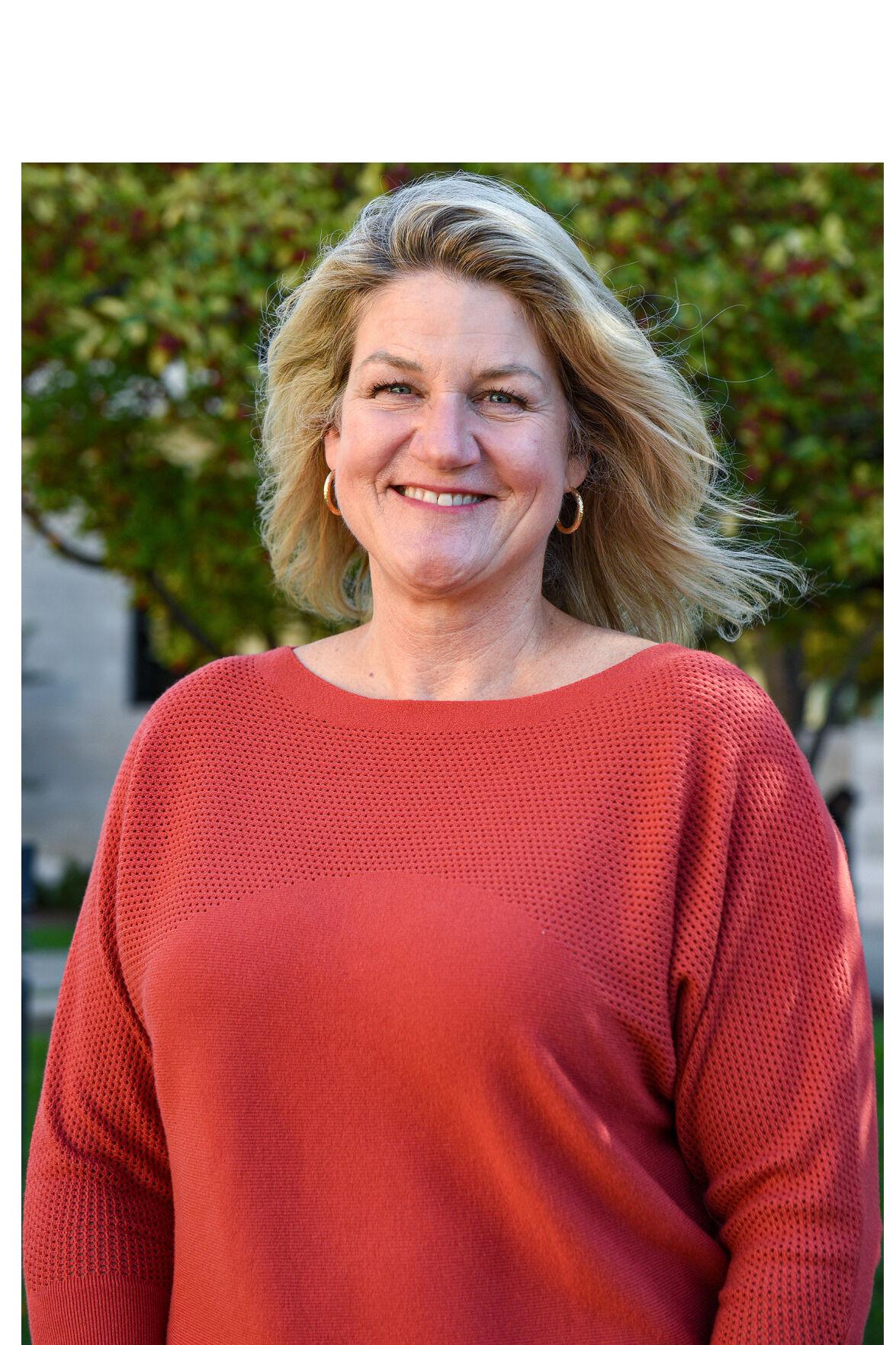
8 IN THE LOOP Q&A VOX MAGAZINE •NOVEMBER 2023



Broadway to Broadway
When going to a Broadway show, audiences will notice that each scene is packed with details. There might be dancers running across high beams, actors on three-story sets and elaborate props flying across the stage. Behind each show is a production carpenter like Paul Wimmer, who makes it possible by overseeing all aspects of construction.
Wimmer is a production carpenter
BY GRACE PANKEY
living in Columbia. He oversees scenery and automation and has been a stagehand for 30 years. Traveling from Columbia to New York City is a long journey, but for Wimmer, that’s part of the job.
On Broadway, Wimmer works with freight drivers, or teamsters, to transfer thousands of pounds of scenery from a semitruck and into theaters while engaging with the directors and actors who must
While working on a Broadway set, Paul Wimmer sometimes entertains his coworkers by pretending his tape measure is a prop, acting like it is a radio.
navigate around it safely. “I’ll be talking with a Tony Award-winning director and maybe I’m standing next to Tom Hanks or Helen Mirren or somebody while something’s moving that can kill them,” Wimmer says.
Enter stage left
Wimmer became involved in the theater business while attending the University
9
VOX MAGAZINE • NOVEMBER 2023
Photography by Sharon Quintana Ortiz and courtesy of Unsplash
Theater productions succeed thanks to people like Paul Wimmer, who lives in CoMo but takes his carpentry to NYC.

of Wisconsin-Madison. His brother was working as a stagehand and recruited Wimmer to help load a rock ’n’ roll arena. After that, he worked with local theaters and the Stagehand Union.
At just 19, Wimmer was working 80 feet in the air, climbing rafters and working with the high steel rigging — all of the lights and speakers suspended from the ceiling.
After graduating from college with a degree in philosophy and getting his International Alliance of Theatrical Stage Employees union card, Wimmer was offered a carpentry position on a Broadway show, where he was able to travel around the country. He did this for about six years before moving to New York.
“There was probably about 10 years where I would go from doing pre-Broadway, where you take a Broadway-level show and you’ll do it in Seattle or Los Angeles or Chicago and set the whole thing up, rehearse the whole thing and then play it to audiences,” Wimmer says. “And sometimes if the audiences didn’t like it, then you tear it all down, load it on the trucks, take it to New York, do the whole thing over again.”
Taking the lead
Wimmer started out as an assistant carpenter and worked his way up to automation. As he learned more about automation and rigging, he began working as a head carpenter where he moved to the stage to help direct rehearsals.
Wimmer works with many people to make sure that things go as planned.
Jessica Creager, an associate lighting designer, has worked with Wimmer on Frozen and will work with him again on Spamalot. Creager says that her work with the production carpenter is vital because they decide where everything goes in the theater.
Creager works with Wimmer to make sure the lighting and rigging goes to the appropriate places and that the rigging doesn’t collide with anything. Anytime Creager needs something moved or help with a motor, Wimmer is the one to talk to.
“He’s my favorite carpenter to work with because he gets it. He’s super kind
Onstage, crew members assemble a set Wimmer built for Frozen. Wimmer often has to manage both tech and talent while assembling sets.
and always game to try something,” Creager says.
Wimmer works with technical directors, general managers and company managers to discuss budgets and the technical and creative visions of the show. As a production carpenter, Wimmer plays a lot of different roles. “It’s challenging for myself, for all the different hats I have to wear.” Wimmer says. “You know I have to be rough, let’s say with the teamsters. Then sometimes I have to be much more diplomatic when I’m on stage dealing with the creative aspect.”
Martijn Appelo, a former production manager, worked with Wimmer on many shows, including Beetlejuice. The show had a large set that needed to get into the theater and Wimmer was the one who made that possible. Appelo says he worked with Wimmer, lighting directors and sound people to make a show come together.
Return to blocking
A flashlight is an essential tool on set for Wimmer, who has to check the rafters to make sure is malfunctioning or is at risk of falling.

After living in New York for several years, Wimmer’s family moved to Columbia in 2016 to be closer to relatives. He joined them six months later. After seeing a couple stagehands who commuted long distances for work, they decided to try it out.
Wimmer travels to New York to help direct rehearsals and the technical aspects of the show. For medium-sized show, this takes about two months. Once he gets it up and running, he comes home for a few months.
“Maybe a month of that I’m just enjoying family time, and then usually two, three, four weeks I start getting the next show and I get all those drawings,” Wimmer says. “I get all the technical specs and then I start doing all those spreadsheets and working with the technical director on how many days it’s going to take.”
After going over spreadsheets, measurements and calculations, he travels to Broadway to work out the kinks. Sometimes he goes to the shop in New York for a week, comes home for a week, and then goes back to New York.
Production carpenters fill the stage and give the audience a sense of space. Without people like Wimmer, the show would not go on.
10 CULTURE THEATER
VOX MAGAZINE • NOVEMBER 2023
Photography by Sharon Quintana Ortiz and courtesy of Paul Wimmer

Rocking out is a walk in The Park
This band bonds over a shared pursuit of music education.
KYLE MAKI, NATALIE-ELIZABETH TAN, NOAH REES AND BEN MILLER
For members of local band The Park, music isn’t just their hobby, it’s a career path. Most of the musicians are MU music students or are in Marching Mizzou.
The six-member act has had a busy 2023. In July, The Park released its debut EP, Demonstrations, and it has been playing some of Columbia’s biggest venues, including The Blue Note and Rose Music Hall.
The start of it all
The Park started about two years ago when bassist Michael “Mikey” Alexander moved from Cape Girardeau to Columbia for college, leaving his old band. Looking for a new band, he reconnected with a friend from fifth grade, singer Olivia “Via” Amos.“He literally texted me and he was like, ‘Hey, do you want to start a band,’ ” Amos says. “I was like with who? And he was like, ‘I’ll figure it out.’ ”
And Alexander did figure it out; the band came together through mutual
friends, acquaintances and a lot of luck. Before the release of Demonstrations, guitarist Greyson “Grey” Smallen brought friend Layden Dukes to a rehearsal. Dukes, armed with a trumpet, decided to improvise and jam with the group. After a few practices, Dukes asked if he could join the band.
“I’ll be the first to admit I was a little iffy about having a trumpet player in a rock band, but everybody loves it,” says Alexander, who is The Park’s bassist. “The more I listen to Layden play, the more and more I appreciate having him. He’s such a driving force in the band. I feel like sometimes without the trumpet it just sounds a little empty.”
Marching to similar beats
Marching Mizzou is a key connector for The Park: Smallen, Alexander and second guitarist Austin Richard are all in the band. And so is Dukes, a trumpet performance major at MU, who also performs with the Columbia Jazz Orchestra. Smallen and Colton Johnson, the band’s
drummer, are music majors, and Richard is a music minor.
The Park’s music, which the members describe as “Midwest something or another,” allows them to experiment with various styles. “We have so many weird influences,” Amos says. “We are definitely in that indie rock umbrella, but there are so many micro-labels, it’s hard to pigeonhole yourself into one thing.”
Some of these labels come out in the technical elements of The Park’s songs. Listeners might notice the atypical rhythms, which are common in so-called math rock, the unconventional vocals heard in Midwest emo and jazz-inspired drumming.
The Park emphasizes a bright sound with layered structures. “I find that a lot of the stuff we write is very complicated,” Smallen says. “We’ll add different chords that are interesting or different time signatures that are ‘mathy.’ ”
During the set, the band performed a cover of “Stacy’s Mom.”
ADDING IT UP
The Park describes its music as emo, jazz and math rock. What is math rock, you ask? The genre is defined as a style of rock music characterized by complex rhythmic and instrumental patterns. Sounds fitting for a group of music students. Find its first EP, Demonstrations, on Apple Music and Spotify, and follow the band on Instagram @ theparkisaband.
The band also enjoys covering songs from other indie rock artists. At Rose Music Hall, The Park covered Japanese American singer Mitski during Mid-Missouri PrideFest.
Success in The Park
The Park’s success grew alongside other local bands that the group has shared stages with. “I think there’s an increased interest in the idea of your local, smaller bands and live music in general,” says Nate Forck, singer and guitarist of local band LA!KA.
For bands like The Park, success can sometimes be as simple as being friendly with other musicians. For one house show, the band reached out to Tri-County Liquidators and Telepathy Club about a collaboration and they all performed together at apartment complex Elevate 231.
Other times, it’s just luck and the willingness to take a leap of faith. The Park’s first big gig at The Blue Note was set up via Instagram. Martin Kamau, The Blue Note’s booking coordinator, says he’d heard of the band and thought they’d be perfect for its Live Music 101 event. Since then, the band also booked shows at Eastside Tavern and Rose Music Hall, where you might find them rocking out — when they aren’t playing football halftime shows.
11 VOX MAGAZINE • NOVEMBER 2023
CULTURE MUSIC
Photography by Remington White
Guitarists Mikey Alexander and Austin Richard of The Park play at Eastside Tavern.
Merrique Jenson, founder and executive director of Transformations, is the only trans Latina leading a nonprofit in Missouri, Kansas and Arkansas. Transformations offers a variety of support that’s aimed largely at transgender people of color.

13 VOX MAGAZINE • NOVEMBER 2023
Photography by Baxter Stein
Merrique Jenson and Transformations raise their voices and extend a helping hand to the transgender community in Missouri and beyond.
Story by Corinne Baum Editing by Mara Dumitru Design by Campbell Biemiller
Earlier this year, Merrique Jenson spoke with Kansas City lawmakers about a resolution to make the city a safe haven for genderaffirming care.
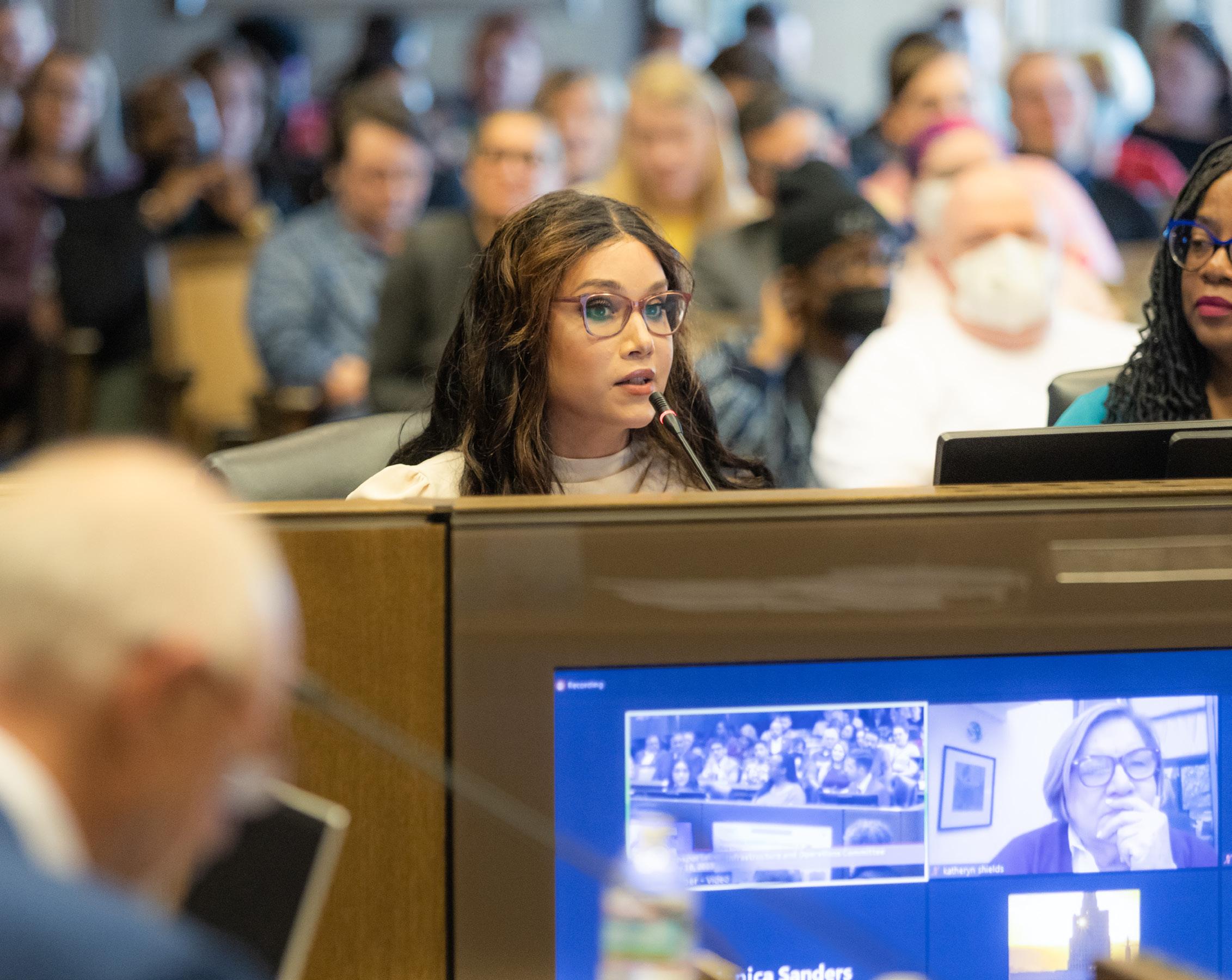
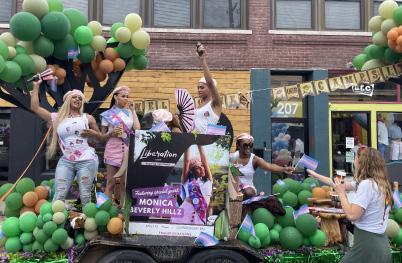
Transformations members participated in the Kansas City Pride parade in June. The group was promoting its Liberation Camp, a leadership development program for transgender people of color.
It’s fair to say that Merrique Jenson is a trailblazer.
Though Jenson is not the first transgender woman of color to become an activist out of necessity, she is someone with a lot of notable firsts. She is the first trans Latina to serve as a nonprofit executive director in Missouri, Kansas and Arkansas and has founded multiple LGBTQ+ support groups and organizations across the Midwest and Ozarks states.
One of those is Transformations. Jenson is the founder and executive director of this Kansas City-based nonprofit that focuses on support for trans and nonbinary youth in survival mode — those in need of food, clothing and shelter — and trans women of color. She has two decades of experience working
in the fields of harm reduction and antiviolence advocacy.
Recently, the 2023 Missouri legislative session and the anti-trans activity in other states has made her job even more difficult and high profile. Missouri legislators introduced 48 different bills that would weaken transgender rights in multiple ways. Two of those bills became law Aug. 28. One severely limits minors’ access in the state to gender-affirming care such as hormones, puberty blockers or gender-affirming surgery. The other prohibits public and private institutions, including universities, from allowing athletes to compete in gendered sports that do not match the sex listed on their birth certificate.
Despite the turmoil and challenges
Jenson has faced in the wake of the legislative session, those who work closely with her commend her approach to the ongoing crisis. “She just has an ability to
14
VOX MAGAZINE • NOVEMBER 2023
Photography courtesy of Transformations
see a vision, even in the chaos, for instance, of this legislative period, and say, not only how are we going to react to this, but how are we actually going to change the conversation,” says Susie McClanahan, the Transformations board of directors secretary.
Transformative roots
Jenson’s early home life in St. Louis was unstable and complex. She was homeless multiple times before the age of 18, and switched schools regularly as a result. Her father was physically abusive and absent for long periods of time, and her mother hid her Mexican heritage and
her children.
After a series of blowout events, Jenson left home for good at age 17. This is not an uncommon scenario for trans women of color. Nearly one third of respondents in the 2015 U.S. Transgender Survey reported experiencing homelessness, and one in eight attributed that homelessness to being transgender.
Growing American Youth, a social support group for LGBTQ+ youth in the St. Louis area, was the first place where Jenson says she felt truly safe. “I broke down, because I’d never met another gay person,” she says.
She credits those early interactions with youth programs as the driving


“We live our life where pretty much we’re constantly thinking about a lethality assessment. What in this situation could potentially kill me?”
Donato Fatuesi (left) is Transformations’ social media organizer. Fatuesi and Merrique Jenson work closely with other groups to amplify the voices of trans communities.
by the Williams Institute at the UCLA School of Law using data from the 2017 and 2018 National Crime Victimization Survey. Of the homicides reported, 67% were Black trans women. Many trans people do not feel safe reporting crimes that happen in their communities, especially non-passing trans women of color, who report being mistreated by police, according to the 2015 U.S. Transgender Survey.
— Merrique Jenson
force for the community work she has done since. Black, queer and trans people from her teen years in St. Louis showed her the power of her voice and leadership abilities, she says. In addition to Transformations, Jenson founded LGBTQ+ youth programs elsewhere, including Chicago and St. Louis. “Youth work has always been a core piece of my passion, because I saw the direct impact it had,” she says.
A new movement arises
Jenson established Transformations in 2016 in the wake of escalated levels of violence toward trans people of color. Over the course of the previous decade, the murders of 10 trans people of color in Kansas City were reported to police. Jenson worked on three of those cases as a community homicide advocate.
While such data is historically underreported or misreported nationally, trans people are victims of violent crimes four times more than cisgender people, according to a study
“We live our life where pretty much everything we do, we’re constantly thinking about a lethality assessment,” Jenson says. “What in this situation could potentially kill me? What could go wrong that could kill me? Or get me raped? Or, you know, have me beat up? Or have me humiliated? I literally constantly am safety planning in my head with the stuff that I do.”
While it began as a Kansas City-based support group, Transformations is now a multistate network in the Ozarks area — Kansas, Missouri and northwest Arkansas — for sharing resources, experiences and resiliency strategies. It addresses the complex web of discrimination that trans femmes of color face, namely, anti-Blackness, trans misogyny, colorism and unstable socio-economic status.
One of the main ways Transformations provides community support is through mentorship opportunities for transgender youths and trans women of color. “There’s nobody else looking out for us,” says Transformations Treasurer JD Bezares. “So we have to take care of each other.”
This sentiment is echoed by 22-year-old Jordan Burns. “As a trans youth, I didn’t really have a supportive family, and there was a group of kids that were in the group that had supportive families and all that,” he says. Burns attended Transformations in its earliest days when he was 16 years old. He was one of the few trans youths of color who regularly came to the group’s events. He and Bezares became
15
VOX MAGAZINE • NOVEMBER 2023
Photography by Baxter Stein and courtesy of flickr/jim fouratt
Sylvia Rivera (above left), was a trans activist who founded the Street Transvestite Action Revolutionaries in 1970.
that of


close through the mentorship program.
“Unless you have someone that has lived that experience, it’s really difficult to gain a lot,” Bezares says. “You need someone that knows and has been there, to not necessarily tell you how to do it, but just tell you how it went for them.”
This is mirrored in the experiences of individuals like Monica DeJesus Anaya, who worked with Jenson. Anaya was featured on RuPaul’s Drag Race season five as well as All Stars season eight under her stage name, Monica Beverly Hillz. “I realized working with Merrique and being a sister with Merrique that we deserve the world and we’re not going to get that sitting back not fighting for it. We have to fight for it.”
After founding Transformations, Jenson moved to Seattle. Now, she frequently travels to Kansas City as the organization’s full-time executive director. For the organization’s former head, Hailee BlandWalsh, and the rest of the board, having
a trans woman of color in the leadership was important. Centering the most marginalized voices within broader minority communities is better for everyone, BlandWalsh says. “You have to explicitly call them in,” she says. “You have to explicitly say ‘we are for you.’ And then everyone else by virtue will be served if those folks are being centered.”
Initiatives for the trans community
Last year, the organization invested $85,000 directly in the Missouri, Kansas and Arkansas trans communities through paid consulting, speaking fees, contract services and microgrants. Microgrants are meant to lower access barriers such as transitional and health care costs. “We know that sometimes the tipping point between someone succeeding and being able to move forward — and kind of like a house of cards or domino effect happening — can be as small as a couple of hundred dollars,” Bland-Walsh says.
Echo Stewart (center) marches with their parents Jenna Stewart and Raea Mills during a Sept. 15 rally in Columbia.
LIBERATION CAMP/TOUR
The camp is part transgender retreat, part Girl Scouts camp. It provides networking and skill building. This year, Transformations also did a Liberation Tour to connect with trans people across Missouri, Kansas and Arkansas.
THE DOLLS ARE THRIVING
The annual two-day summit spotlights leadership, wisdom and mentorship. Get involved in these programs at transformationskc.org.
In addition to the microgrants, youth mentorship opportunities and organizing work, Transformations also offers programs and services beyond the traditional scope of a grassroots organization. Its national virtual summit, The Dolls Are Thriving, was created specifically for transgender women of color to create a nationwide network. It’s how Transformations’ social media organizer, Donato Fatuesi, got her current position. “That’s part of the beauty of Transformations’ programming,” Fatuesi says. “Whether it’s Liberation Camp, or The Dolls Are Thriving or the Liberation Tour, these are all leadership pipelines and mentorship opportunities for younger trans folks and people in survival mode.”
Privilege of passing
Although speaking to elected officials should feel like a conversation with a neighbor, that’s often not the case for trans people of color. A majority of people who testify in Jefferson City are those who feel the most welcome in government spaces because of their privileged place in society.
We can see this as far back as the beginnings of Pride in the post-Stonewall era. Activists like Sylvia Rivera, who founded the Street Transvestite Action Revolutionaries, accused organizers and participants in the 1973 Christopher Street Parade of placing whiteness and a desire for peaceful relations above their queerness.
Within the subset of the trans community, this racism comes into play in a variety of ways as well, which is what Jenson noticed in the wake of anti-trans legislation. “As these things are coming down the pipeline, I guarantee you what we’re going to watch is a bunch of white fragility happen,” Jenson says. “A bunch of white folks are now concerned that all of a sudden they might lose their rights, but we know as Black and brown trans women that our rights have never been guaranteed. That gender-affirming care was never guaranteed.”
The ability to advocate in front of legislators is, by its nature, privileged. Those who testify have to know when they can speak to members of the General Assembly, with as little as 12 hours notice. Then, they must be able to take off work, afford the gas money to travel
16
Photography by Bailey Stover
VOX MAGAZINE • NOVEMBER 2023

Dayton Shelley, Iva Lastarria and Sam Friedman (left) march with a crowd of protesters along Ninth Street Sept. 15 during a rally to support transgender health care. “(Lawmakers’) decisions are affecting youth everywhere,” says Lastarria, who carried a “Protect Trans Kids” sign.
“It’s not good what they’re doing.”
to Jefferson City and be able to deal with the heavy emotions that come with walking into a room partially filled with people who believe your inherent existence is dangerous.
“It’s often white parents talking about their white children and how their children aren’t going to be safe, which honestly, is really insulting, when the reality is their children are not probably going to be the ones who are murdered,” Jenson says. “It’s taking up a lot of space.”
The battle for rights
While only two of the 48 bills ended up passing in the 2023 session, those bills and the discussion around them, as well as other actions that followed raised a myriad of concerns for Transformations and other trans organizations across the state. Notably, it was the first time that a state had officially tried to place restrictions on trans adults. “It’s going to lead to more transphobia from individuals, because they think that that mindset is acceptable,” Transformations’ McClanahan says.
However, Jenson doesn’t have the choice to wallow in what’s happened. “For trans women of color, there’s nothing we do — the way that we navigate community, we navigate our own families and we navigate resources — where we can really kind of like step back and be like, ‘Oh, you know, like, this little thing hit me, I’m gonna shut down and be sad,’” Jenson says. “It’s like, no, buck the fuck up.”
15

What will happen next for the trans community in Missouri is unknown. Challenges to the new laws and rulings are in progress. Will the next legislative session bring more anti-trans bills? What should the community and its allies be doing? Is the safest place for trans people outside the state?
What is overwhelmingly clear is that this fight isn’t over. Merrique Jenson and the Transformations team are ready. “I know the power that I have, no one can take that away,” Jenson says. “I know how badass Transformations is going to be, even in this political climate. I know that what we’re doing is literally radical and groundbreaking.”
17 VOX MAGAZINE • NOVEMBER 2023
Photography by Bailey Stover
Dex Smith, a transgender man studying English at MU, chants at the Sept.
rally in support of trans health care.

A GROWING MOVEMENT AGAINST
BAIL
The nonprofit Fair Shake Flowers is a part of an increasing conversation about the inequities of cash bail and its effects on people of color and low-income communities.
STORY BY ATHENA FOSLER-BRAZIL EDITED BY RICKY SCHODL DESIGN BY AVA HORTON

VOX MAGAZINE •NOVEMBER 2023
1818
Throughout the spring and summer, after she puts her two daughters to bed, Tory Kassabaum spends Tuesday nights filling her bathtub with flowers. Vases and jars bursting with zinnias, coneflower, milkweed, aster and other, mostly native, blooms crowd her bathroom as she prepares for the Wednesday afternoon farmers market, where she will sell the bouquets. Kassabaum loves being surrounded by the blossoms, but that’s not the point of these evenings spent on floral arrangements. Almost all of the money she makes through flower sales goes directly toward bailing people out of the Boone County Jail.
FREEDOM ISN’T FREE —

Kassabaum calls her fundraising project Fair Shake Flowers, and she has been growing flowers and assembling bouquets for bailouts for four years. The blooms are grown in Kassabaum’s own Columbia garden as well as that of her mother, Nancy. During the midweek farmers market season, May through September, the three generations of Kassabaums set up together. Nancy and Tory take turns entertaining Tory’s young daughters while the other sells bouquets and talks bail reform with shoppers.


THE CASH BAIL SYSTEM EXPLAINED
Bail is the money an arrested person must pay in order to be released from jail prior to their court date. When the defendant appears in court, the full bail amount is refunded to them or their bondsperson. If a defendant cannot afford to post bail, they’re kept in jail.
Bail is often seen as an incentive to appear in court as well as a disincentive to commit more crimes, says Rachel Wechsler, an associate professor of criminal law at the MU School of Law. Wechsler focuses on victims and restorative justice. “Politicians, the public, see this as a way to prevent people who are accused — we’re talking pre-trial, they haven’t actually been convicted of anything, but people who allegedly committed crimes — keeping them ‘off the streets,’ ” Wechsler says.
Bail bonds can be paid directly by the defendant or by a bondsperson. A bondsperson takes a percentage of the total bail as a nonrefundable fee in exchange for assuming the responsibility of ensuring defendants return to court. “The bail industry is an industry that is
very profitable, and people who go to bail bondsmen are in a very vulnerable position,” Wechsler says.
In September, Illinois passed the Pretrial Fairness Act, becoming the first state in the country to abolish bail and never demand a monetary payment for freedom. The act places the burden on the government to prove why a defendant poses an immediate threat to the community and should be held in pre-trial detention.
In 2019, the Missouri Supreme Court ruled on cash bail reform, limiting judges’ ability to use cash bail as a condition of release and requiring that they consider nonmonetary conditions first, such as treatment programs, travel restrictions or checking in with the state. Cash bail has come under increasing scrutiny over the past decade for perpetuating cycles of poverty and disproportionately detaining people from marginalized and impoverished communities. According to 2023 data from the Prison Policy Initiative, over 80% of those jailed under local authority
VOX MAGAZINE • NOVEMBER 2023
1919
were awaiting trial for their charges. “There are some pretty serious collateral consequences even for being incarcerated for a short period of time,” Wechsler says. Pre-trial detention can lead to job loss, inability to pay rent or car loans and prevents defendants from caring for their children. Wechsler has a Ph.D. in criminology, and much of her work has focused on understanding structural drivers of crime. She says economic necessity and financial insecurity can lead to the feeling that a person has nothing to lose. “Many of the consequences of having a cash bail system can make the drivers of crime in society worse,” Wechsler says.
HOW IT WORKS IN BOONE COUNTY

Cash bail has been the focus of Kassabaum’s activism since 2017 when she was involved in starting a community bail fund with Race Matters, Friends, a Columbia nonprofit focused on racial equity. For most of its existence, all of Fair Shake Flowers’ profits went to the RMF bail fund, but this summer the nonprofit shut down the bail fund’s operations due to disagreements about how to manage funds. Now the group of volunteers who oversaw the RMF bail fund have started the Boone County Community Bail Fund.
“I just recognized what the racial landscape looks like in our country, and especially in the Midwest, and I wanted to get involved,” Kassabaum says. “And then this bail fund idea came up and it felt like a really practical, on-the-ground way to help individuals.” After Kassabaum’s first daughter was born, she was looking for a way to stay involved with the bail fund that was conducive to life as a new mother. That’s when Fair Shake Flowers was born.
Jeanne Mihail volunteered at RMF with Kassabaum and is involved with the
“Many of the consequences of having a cash bail system can make the drivers of crime in society worse.”
RACHEL WECHSLER CRIMINAL LAW PROFESSOR, MU
team of 12 who are establishing the new county bail fund. Mihail helped collect and analyze data from the Boone County Jail, sifting through the 07:00 Report, a daily database of everyone booked into the jail within the past 24 hours, as well as data on current detainees. She analyzed both databases from July to December 2020. “Some of what I found was not surprising, but it was shocking,” Mihail says.
She analyzed the data by ZIP code, assessing which ones were most represented in the reports. ZIP code 65202, which has the city’s largest Black population, accounts for 33% of Columbia’s population but 49% of criminal charges. “Demographically, in the city of Columbia, African American people make up about 11.1% of our population,” Mihail says. “And they make up about 44% of the population of Boone County Jail.”
These disparities in representation are consistent with national trends. According to 2020 data from the U.S. Census Bureau, Black people made up 14.2% of the population, but currently represent 38.6% of inmates in the U.S.
“People of color are overrepresented among low-income communities,” Wechsler says. “So the people who are going to be least likely to be able to make bail if they’re required to pay cash bail are more likely to be people of color.”
As a succinct indictment of a flawed system, Kassabaum says “cash bail preys on poverty.”
In 2022, the poverty rate for Black families in Columbia was 30.1%, much higher than the national average, while the poverty rate for white families was 6.9%, slightly below the national rate.
A DISPROPORTIONATE EFFECT
Cash bail further destabilizes already economically fragile groups. A 2022 report from the U.S. Commission on Civil Rights found that pre-trial detention was associated with increased likelihood of conviction, lack of access to housing, increased likelihood of recidivism and negative effects on employment status.
A key part of keeping those bailed out from being put back in jail is ensuring they appear for their court dates. If a defendant doesn’t show up to court, a failure to appear warrant is issued, and they can end up back behind bars. Mihail says that each time a failure to appear warrant is issued, it gets more expensive to bail someone out. Part of what she does for the bail fund is send reminders to defendants about their court dates. “Sometimes failure to appear is for want of transportation — they don’t have a vehicle (or) they don’t have a ride,” Mihail says. “And then there’s things like if somebody doesn’t have childcare, so they skip court.”

MISCONCEPTIONS OF BAIL
When the Illinois Pretrial Fairness Act was being discussed, law enforcement officials filed multiple lawsuits against it. In general, prosecutors, the bail industry and certain police forces oppose bail reform on public safety grounds.
The Prison Policy Initiative, a non-




VOX MAGAZINE •NOVEMBER 2023 2020
S S S S

In addition to the Boone County Bail Fund, profits also go

profit conducting research and advocacy on the harms of mass incarceration, looked at data from counties and cities across the country that had implemented pre-trial detention reforms over the past decade. It found no significant change in public safety before and after reforms were implemented. New Jersey, for example, after a 2017 reform that nearly eliminated use of cash bail, saw crime rates fall across the board, the most dramatic decrease being a 32% drop in homicides between 2016 and 2018.
Wechsler says that one reason prosecutors are often opposed to bail reform is that cash bail and the threat of pre-trial detention puts pressure on defendants to take plea bargains. “Our system relies on the vast majority of defendants taking pleas,” Wechsler says. “Prosecutors want them to take pleas, but law enforcement also benefits from them taking pleas because if every case
went to trial, police officers would have to do a lot more testifying.”
According to a 2023 report from the American Bar Association, fewer than 2% of the 80,000 defendants who faced federal charges in 2018 went to trial, the vast majority taking plea bargains. Wechsler says that if every case went to trial, “the system would collapse.”
WHAT ARE COMMUNITY BAIL FUNDS?
The story of how Kassabaum found her way to Race Matters, Friends is a familiar one.
“Like many other white people, I think I had an awakening about the state

1
ARREST AND ARRAIGNMENT
If someone is alleged to have committed a crime, they are arrested, booked and held in jail until their arraignment, where charges are officially filed and a bail amount is determined.
2 3
BAIL PAYMENT
One option is to pay the bail in cash to get out of holding. That can be a person’s own cash or money from a bail fund, but bondspeople are another option. The bondsperson charges a nonrefundable fee of about 10%, however, Missouri has no set maximum. The third option is to not pay the amount and remain in custody.
COURT DATE
If bail has been posted and the court date is attended by the defendant, bail is refunded. If the person does not show up in court, the court keeps the money and issues a failure to appear warrant.


VOX MAGAZINE • NOVEMBER 2023
Tory Kassabaum (left) sells flowers to Jenna Sorensen at the Columbia Farmers Market.
to The Center Project and CoMo Mobile Aid.
2121
Photography by Lily Kleinhenz
Cash bail preys on poverty.

Tory Kassabaum (left) and her daughter, Orella, 4, and mother, Nancy, cut flowers in the backyard of Nancy’s home. Both women grow plentiful native plants in their yards.
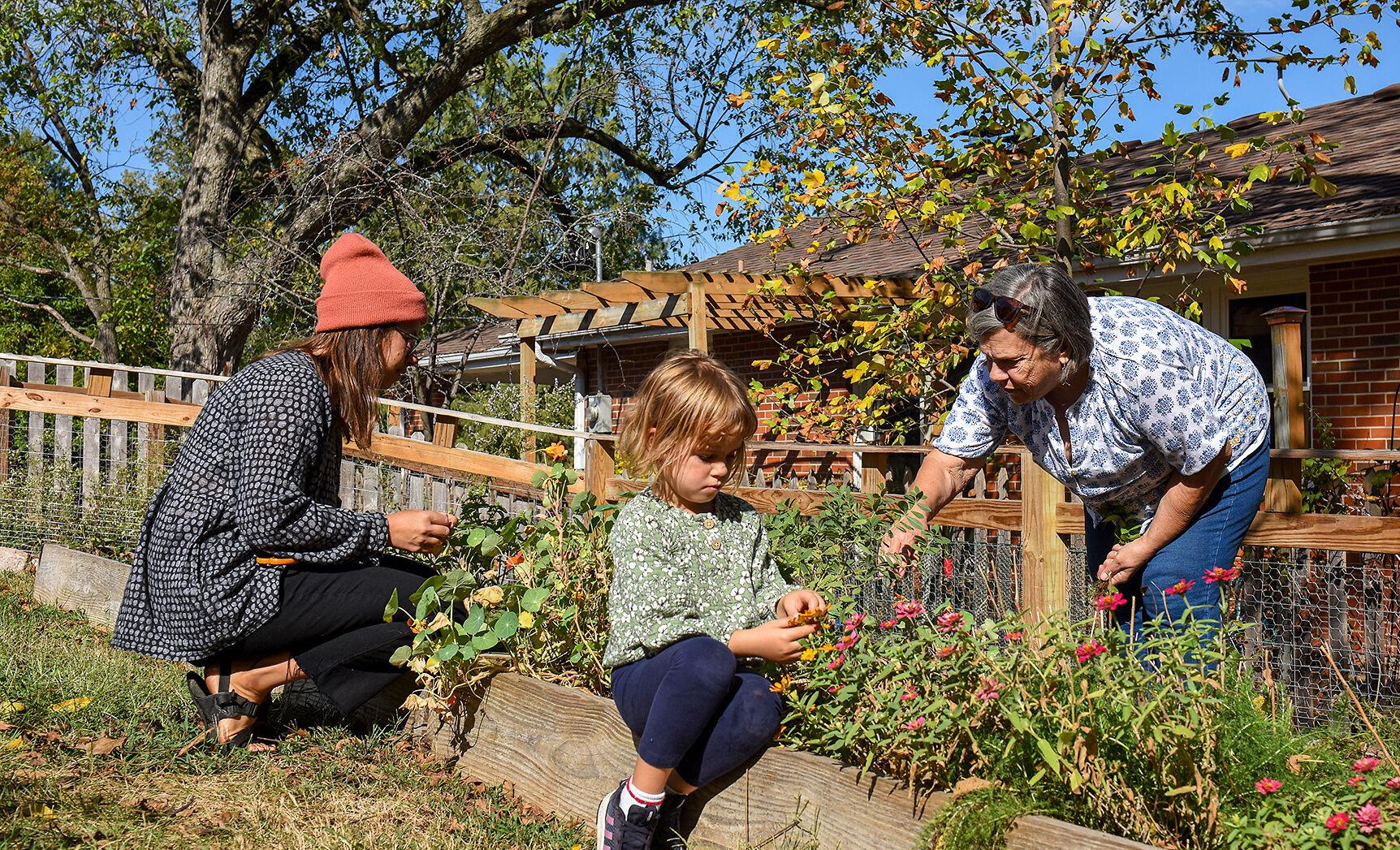
of racial justice around the shooting of Michael Brown,” she says.
Kassabaum originally hails from St. Louis. Following Brown’s 2014 murder in her own city, she felt compelled to act.
Community Bail Fund is a part of a different organization, the National Bail Fund Network, a directory of over 90 community bail funds.
Peggy Placier worked with Kassabaum and Mihail on the RMF bail fund and is involved in establishing the new one. “We’re doing things to directly aid people who were victimized by the criminal justice system in various ways, mostly by incarceration because of poverty,” Placier says. Kassabaum and Mihail also gravitated to the bail fund due to its direct, tangible impact on people’s lives. “We’re just giving them freedom when they deserve freedom,” Kassabaum says. “That was really a powerful thing to realize.”
The bail fund has three criteria it follows when deciding who to bail out: the person must be a Boone County resident, have a bail amount of $3,000 or less and have no open charges in other counties. In earlier stages of the RMF bail fund, Kassabaum says people whose charges included violence would not be bailed out, but that criteria was dropped.
A SPROUTING FUND
To get involved in local bail funds in Boone County, consider donating to the Boone County Bail Fund at CoMo Gives in December.
Other ways to get involved are speaking with local and state representatives about changes to bail systems.
Increasing coverage of events highlighting structural injustices has caused people to act within their communities. One response to a need for solutions has been the growing popularity of community bail funds, which are typically nonprofit initiatives that use donations to free people facing pre-trial detention. Bail paid by community bail funds goes directly to the court, and the groups are refunded the amount when the defendant appears for their court date.
The Bail Project is a national community bail fund network with locations all across the country. The network provides defendants with reminders and transportation to their court dates, resulting in 90% of clients returning to court even without any of their own money on the line. The Boone County
The Boone County Community Bail Fund, now the sole bail fund in the county, is awaiting its nonprofit status before beginning operations. Placier says that while links to donate seed money are not yet active, the fund will be participating in December’s CoMo Gives, an annual fundraiser for mid-Missouri nonprofits. Links to donate to the fund will be live by then.
Though the chill in the air means Fair Shake Flowers will take its seasonal break from selling bouquets, the Kassabaums continue fundraising by selling seeds, dried flowers, paintings and other crafts at the farmers market throughout the winter. Even though her kids aren’t old enough to understand the complexities of cash bail, Kassabaum wants them to understand the ethics that underlie direct action and mutual aid.
“There is an important part of me wanting my kids to be involved,” Kassabaum says. “To see that we spend time doing things for other people, and that’s what we want our community to look like.”
Name VOX MAGAZINE •NOVEMBER 2023
Photography by Photographer
2222
Photography by Sharon Quintana Ortiz
TORY KASSABAUM FAIR SHAKE FLOWERS ” p p p p PLANTING LOCAL SEEDS
Fair Shake Flowers will be at the Columbia Farmers Market on Saturdays during the cooler months. Find them on Instagram @fairshakeflowersss and on Facebook as Fair Shake Flowers.



More on their plate
Delia’s on Stadium expands on original downtown location with more space for new dishes that showcase their family history.
BY SOPHIA KOCH
David and Delia have lived in Columbia for over 11 years. But it truly became their second home when they decided to open Delia’s Mexican Grill.
They opened their first restaurant in December 2020. It was a hit right away.
Just under three years later, David and Delia took a chance and opened a second location, Delia’s on Stadium, in August. The building used to house Cheerleader Pub & Grill, and is attached to the Holiday Inn near Stadium Boulevard and U.S. 63.
Delia says they like to start with what they have and build up from there. The interior layout of the restaurant hasn’t really changed since its former
Agustin Ruiz-Ruiz plates fajitas while Armando Lopez holds the platter.
David and Delia Lopez opened Delia’s Mexican Grill downtown in 2020 and expanded to add a second location in August.
occupant: A horseshoe bar sits in the middle of the dining room, with MU signs lining the walls.
Home sweet home
Delia hails from California and David is originally from Mexico. They have sprinkled memories around their restaurants that remind them of home. The name Delia comes from Delia’s grandmother, whom she’s named after. The rose on the restaurant’s logo holds meaning for Delia and her grandmother.
In the Catholic faith, roses represent the Virgin Mary, which has meant a lot to the family through generations.
23
VOX MAGAZINE • NOVEMBER 2023
Photography by Cam Medrano
SO MANY PASTABILITIES P. 25


The number 1010, part of the phone number for the downtown location, is David and Delia’s lucky number. Their third child was born on the 10th at 10 a.m. “So it’s like little pieces on the small location that we put together, that actually mean something,” Delia says.
Opening the family cookbook
After operating in the heart of the city, David and Delia knew they needed more space. At the Tenth Street location, there’s no room for a walk-in cooler or freezer, so they needed a pragmatist’s touch when creating their menu. The menu is small and they serve traditional Mexican dishes: chimichangas, nachos, fajitas, molcajete,
David Lopez (above) greets customers in the dining room of their second location. The decor remains unchanged, but Delia Lopez says they will add their own touches. Pablo Huaracha (left) crafts a cocktail in the large bar area.
SEEING DOUBLE
Delia’s now has two locations, the new one on 1400 Cinnamon Hill Lane and the original on 201 N. Tenth St. Both are open Tues.-Sun., 11 a.m. to 9 p.m.
tacos and Mexican corn.
Expanding or even relocating Delia’s was something they’d always talked about. While running Delia’s Mexican Grill, now referred to as “little sister,” the Lopezes were able to save up for a second restaurant, which became known as the “big sister.”
The Stadium location had long caught David’s eye, so when it became available, they quickly snatched it up. “The kitchen here is a lot bigger, (so)
the menu can be a lot bigger,” Delia says.
The menu is built around the traditions and recipes from the Lopezes. “The tilapia dish is one of our favorites that me and my husband like, it’s like how we do it at home,” Delia says. The fish is a freshgrilled fillet served on a bed of Spanish rice with vegetables, lettuce and avocado.
Delia’s favorite meal is Pollo la Crema, which is served at the Stadium location. It’s chicken, rice and a creamy sauce. The entrée is also a special meal she shares with her mom. “Every time it was my birthday that was my choice, she had to cook at home,” Delia says. “Even when I got married, that was the dish for me.”
Happy customers, happy life
David and Delia have developed a family in Columbia through their conversations with each customer.
Scott Schaefer was a regular customer of David’s when he worked at other restaurants. Delia’s Mexican Grill became his go-to when he found out David owned it. “It’s our favorite Mexican restaurant in town,” Schaefer says. “(David) takes great pride in making sure everybody is having a good time and getting fed,” Schaefer says.
“I think the best feeling of it is that they’re (the customers are) actually a part of being on the journey with us, seeing how we started from the bottom,” Delia says.
The bigger size of the second restaurant, Delia’s on Stadium, lets the Lopezes offer a wider variety of dishes, including this plate of shrimp tacos with Spanish rice and black beans.

24 EAT & DRINK RESTAURANTS
VOX MAGAZINE • NOVEMBER 2023
Photography by Cam Medrano
Into the pasta-verse
Molto Pastificio, a gourmet pop-up, brings passion and variety to the world of pasta.
BY ATHENA FOSLER-BRAZIL
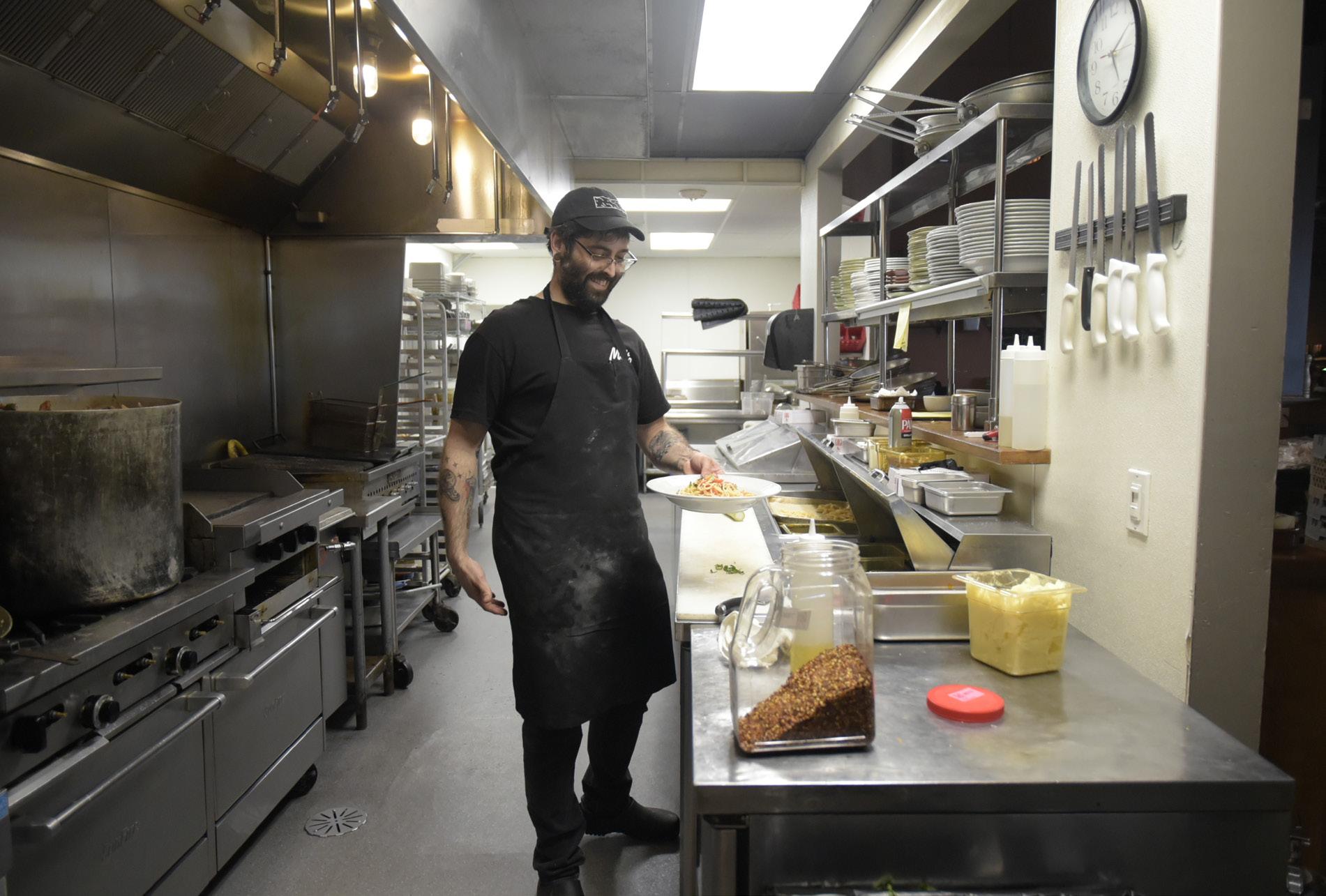
Standing at a wide wooden table in the tidy, brightly lit kitchen of Barred Owl Butcher & Table, sous chefs Kyle Bogden and Shane Guinnip crack jokes as they pick what pasta shape to make next. Bogden folds tortellini while Guinnip pipes a ricotta-Parmesan filling onto a sheet of dough that will be crafted into an agnolotti shape.
Bogden and Guinnip are the minds behind Molto Pastificio, an Italian food pop-up specializing in handmade pasta. The pair has been in charge of making the pasta at Barred Owl for about two years. Barred Owl co-owner Josh Smith got them their first mattarello — a large wooden rolling pin traditionally used to make pasta in Italy — in December 2022, and their passion was ignited. The mattarello transformed their process.
“Once we figured out that we could do it more quickly, more efficiently, and,
in our opinion, better than with the machine, it was kind of on,” Guinnip says. “We kind of fell in love with making pasta in that manner.” They begin with a ball of dough, using the mattarello to slowly roll it out and extend the edges to create a large, smooth sheet that falls over the edge of the table like fabric. Draping the sheet over the mattarello, they hold it up to the light to check for an even thickness. From there, the possibilities are endless.
Their first pop-up event as Molto was at Zipper Fest, a September arts festival. The project came out of their desire to pair a casual, carry out atmosphere with high-quality, scratch-made Italian food.
“What really means a lot — and what we’d like to do more of — is comfort food,” Guinnip says. “Comfort food using locally sourced ingredients that we
to Molto Pastifico. Their new pop-up incorporates elements of Barred Owl, namely local sourcing and seasonality, implementing what they learned.

Garganelli, an egg-based pasta, is most often served with parmesan and nutmeg, which are caught by the pasta’s grooves.
Kyle Bogden and Shane Guinnip shaped about a dozen kinds of pasta to showcase the variety in their pop-up shop menu.
can just really put everything into and make it the best we can.”
Bogden and Guinnip credit Smith for giving them their first tools, as well as the time and space to develop their skills, exploring their creativity throughout Molto’s evolution. “I had good mentors growing up in the business,” Smith says. “I’ve always kind of felt like that’s what we should do — inspire and motivate but also allow people to flourish in their own right.”
25
EAT & DRINK POP-UPS VOX MAGAZINE • NOVEMBER 2023
Photography by Cam Medrano
Kyle Bogden (left) and Shane Guinnip had worked together on a pop-up at a Dismal Niche event prior
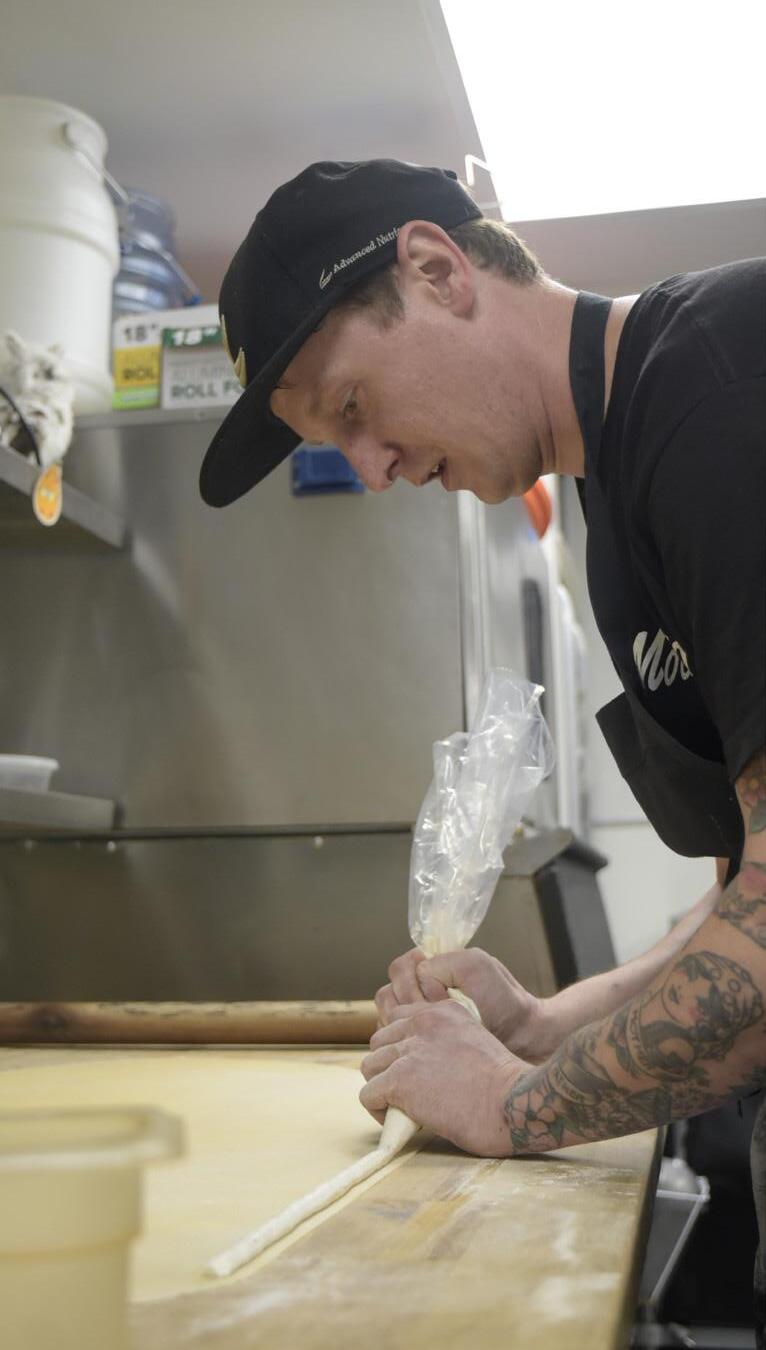

PLAYING WITH PASTA
AGNOLOTTI
This rectangular stuffed pasta has fillings like ravioli, but is smaller.
GARGANELLI
These short tubes of egg pasta often are seasoned with nutmeg and Parmesan.
TORTELLINI
The ring-shaped stuffed pasta commonly is filled with meat, cheese and vegetables.
Molto incorporates many of the foundational elements Bogden and Guinnip learned at Barred Owl, such as an emphasis on seasonality and local sourcing.
The duo has played with dozens of pasta shapes, using traditional Italian tools like the chitarra, a slatted wooden frame used to make some types of spaghetti, as well as experimenting with random kitchen items to create textures and shapes.
monthly, carry-out only pop-up series called Molto Mondays that will take place out of the Barred Owl butcher shop. Updates and announcements are given @moltopastificio on Instagram.
“We’re putting everything into this,” Bogden says. “Molto in Italian means a lot. So, it means a lot to us to put this food out, to make it good.”
Shane Guinnip pipes filling onto pasta dough. “It’s my job, but there’s nothing in my life I would rather be doing,” Guinnip says.
Molto’s menu is ever-changing and the smaller scale gives them more flexibility to experiment than the restaurant, which seats over 100 people when full. “They’re using innovative practices like using beets in pasta, spinach fillings, they’re working really seasonally and it’s really handcrafted,” says Emily Edwards, a Barred Owl regular who has had Molto’s pasta on multiple occasions.
“They have exactly the perfect amount of passion for it,” Smith says. “They’ve taken the torch I handed them and have gone way bigger with it.”
The pair are beginning a twice

Guinnip and Bogden source many of their ingredients, including basil and mozzarella (above), from the Columbia Farmers Market.

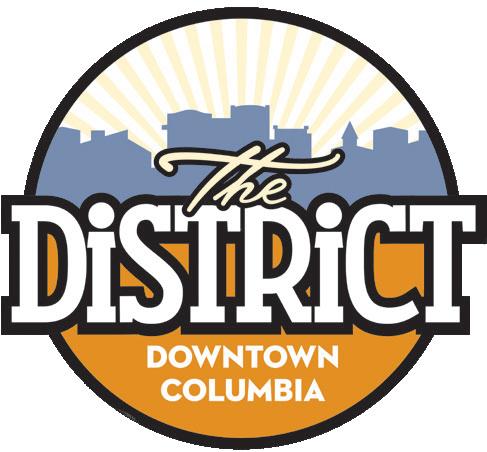



26 EAT & DRINK POP-UPS
VOX MAGAZINE • NOVEMBER 2023
Photography by Cam Medrano
SATURDAY, NOVEMBER 4, 2023 10:00 AM 8:00 PM KICK-OFF THE HOLIDAY IN Annual Holiday Shop Hop - 10am Horse-Drawn Carriage Rides - 4pm The District’s Enchanted Forest - 7pm Scanformoreinfo

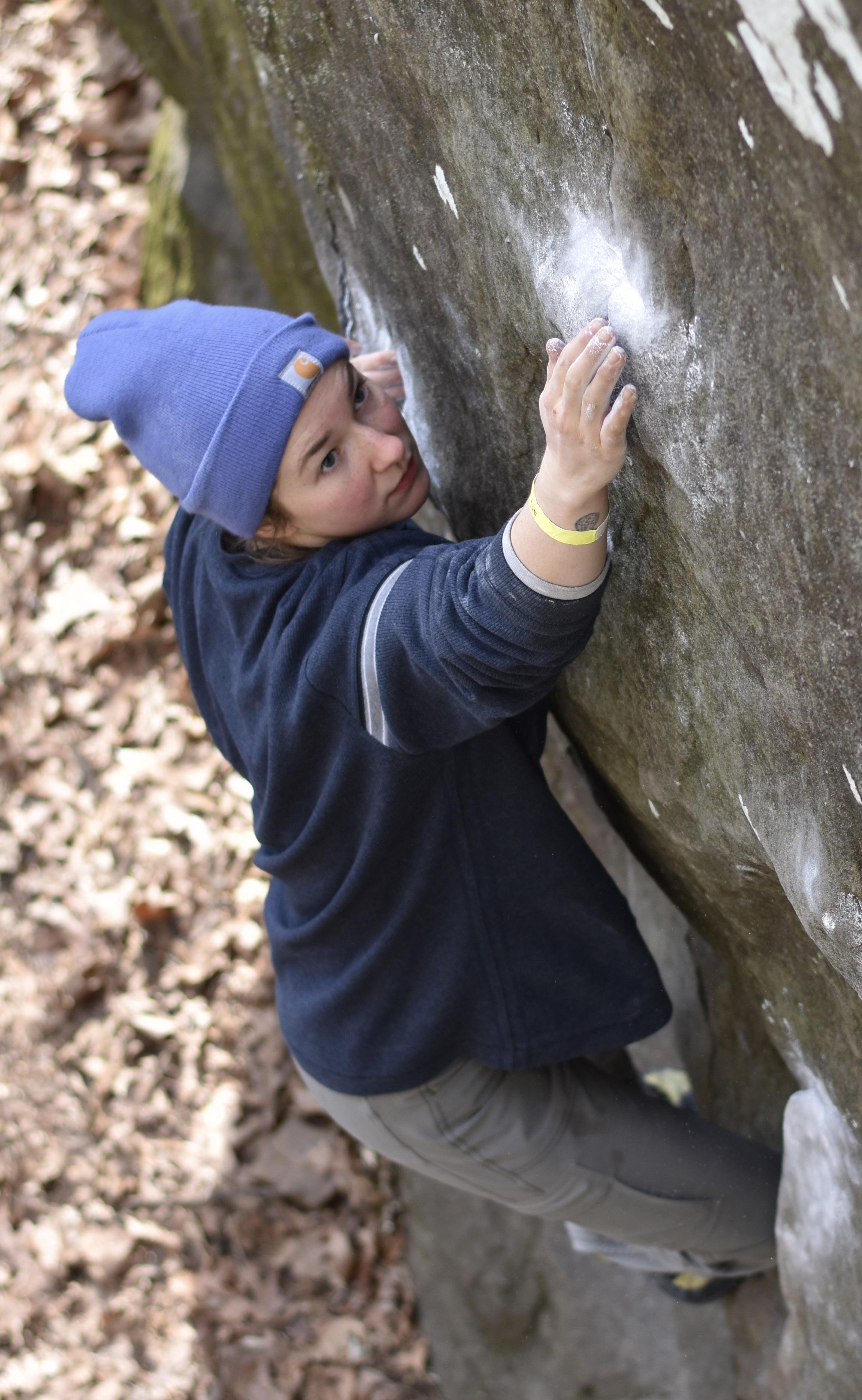
Halle Jackson, reaches for a handhold while bouldering. Jackson, who is also a former Vox multimedia editor, says she has found her best friends through climbing.
Partners in climb
Columbia’s bouldering community seeks new heights together — no ropes and no limits.
BY ANDREA MERRITT
When Jack Weakly is boulder climbing, he feels weightless.
“When you’ve got a whole crowd of friends behind you — cheering you on — it can often feel like gravity has been turned off for a minute,” says Weakly, a boulder climber of four years and CoMo Rocks employee. “Because I’ve got all this energy behind me and these people pushing me, it can feel effortless.”
Bouldering is a form of rock climbing where participants climb rock structures without safety ropes. The rock structures are typically 15 feet high and can be indoors or outdoors.
Bouldering includes grades, which determine the level of difficulty of a climb. The grades are based on the Hueco system, also known as the V-scale. The grades range from VB, the easiest, to V16, the hardest.
In Columbia, two popular outdoor bouldering spots are the areas around Gans Creek Recreation Area and Rock Bridge Memorial State Park. Indoor climbing is offered at CoMo Rocks.
Welcoming attitude
“Bouldering isn’t just about the adrenaline of free dangling from a cliff. Columbia’s bouldering community is welcoming and uplifting,” says Adelin Scanlon, who has been a boulder climber for six years. Scanlon says bouldering isn’t as intimidating as other activity-based communities. “You can really just walk in and strike up a conversation
27 VOX MAGAZINE • NOVEMBER 2023
Photography courtesy of Reid Jackson
with someone, and usually find common ground and work on routes,” she says.
Jordanne Steuck, vice president of the Mizzou Climbing Club, says she believes bouldering tends to be more welcoming because it’s less competitive than other sports. Bouldering is based on “how you want to do it” and not “how everyone else does it,” she says.
In both outdoor and indoor bouldering, participants have a lot of creative freedom in how they tackle routes. Participants choose their own routes in outdoor bouldering. As for indoor bouldering, the suggested routes are dictated by the colors of the holds.
Bouldering isn’t just a way to exercise your mind and body, it’s where friendships thrive. “It’s just a really easy way to keep my friend group diverse and inclusive without having the stress of where to get together, how much is it going to cost and what should we do,” Steuck says. She has also been happy to see more women getting into the sport in Columbia.
The sport is beginner friendly because it doesn’t require much equipment or prior knowledge of climbing. Two pieces of recommended equipment are a crash pad and properly fitting climbing shoes. To make the sport more affordable, Steuck suggests buying equipment on Facebook Marketplace or Poshmark. Play It Again Sports in Columbia also sells used equipment at discounted prices.
Social climber
Bouldering gives rock climbers a collaborative atmosphere in which they can build lasting friendships, on and off the rock. “The sport is more social than other forms of climbing,” says Anthony LaMonica, a cross-country boulder climber of five years. Collaboration is needed to figure out the best way to climb a route. With shorter heights than some other forms of climbing, participants are easily able to climb routes repeatedly with others and find the best way to climb them together. People also
CHOOSE YOUR CLIMB
Find the climbing type for your level of adventure.
BOULDERING is scaling small rock formations, artificial or natural, without ropes or harnesses.
FREE CLIMBING uses a rope only as a safety support, not to aid the climb.
FREE SOLOING is climbing above 40 feet high without protective gear.
LEAD CLIMBING involves a leader climbing to the route first to set the ropes into anchors, while another climber feeds slack from the ground.
TOP ROPE
CLIMBING uses a safety rope that is already set at the top of the structure, typically done by hiking there to anchor the rope.
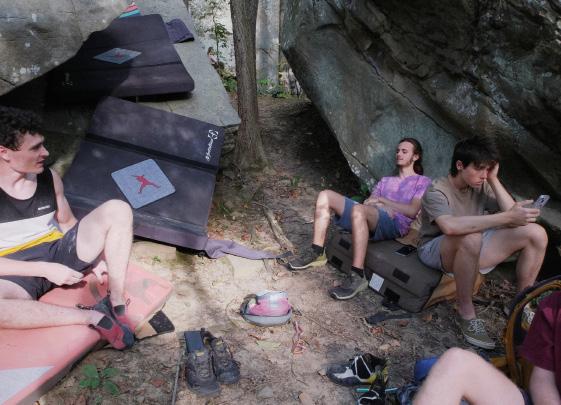
cheer on the active climber and discuss sequences, holds and troubleshoot while they climb. “(Bouldering) feels like I’m more connected with everyone else when I’m doing that and having just more of a group experience,” LaMonica says. “Whereas with on the rope, I feel like it’s more of an individual experience.”
Halle Jackson, a boulder climber of seven years, adds that rope climbing is best with two to three people, while bouldering is best with a larger group. “When there are multiple people trying to figure out how to climb a problem, (when) you’re outside in the woods, you’re really working together to figure out how something works,” Jackson says. “That sort of teamwork aspect is really cool and really understated.” Through bouldering, Jackson says she has made some of her best friends and some will even “be at my wedding when I get married.”

28 CITY LIFE OUTDOORS
VOX MAGAZINE • NOVEMBER 2023
Photography courtesy of Reid Jackson
Anthony Lamonica (left) climbs a steep boulder. Lamonica, Tyler Hatten and Finn Kingsley (above) take a breather after climbing. The crash pads behind them are the only safety reinforcements boulderers typically use.
TO-DO LIST
Your curated guide of what to do in Columbia this month.
ARTS
Fall Into Art
The 12th annual Fall Into Art event will feature work from more than 30 local artists, including woodwork, jewelry, fiber and more. Come for the art and stay for live music, food trucks and a silent auction to benefit Compass Music Center, a nonprofit supporting local musicians. Oct. 28, 10 a.m. to 5 p.m.; Oct. 29, 10 a.m. to 4 p.m., Knights of Columbus Event Center, free, 816-446-0535
Elevate
The Mareck Center for Dance presents three world premiere performances during its 18th annual fall performance, Elevate. Nov. 3 and 4, 7 p.m., Missouri Theatre, $32$48, 882-3781
The Piano Lesson
Columbia Entertainment Company will perform The Piano Lesson, a Pulitzer Prize-winning play by August Wilson. Follow Boy Willie on his visit home to sell a family piano against a backdrop of the Great Migration. His sister insists on keeping the heirloom, which is adorned in designs carved by their enslaved greatgrandfather. It’s a story of reconciliation and grappling with one’s past during a period of change. Nov. 9-11 and 16-18, 7:30 p.m.; Nov. 12 and 19, 2 p.m., $15-20, 1800 Nelwood Drive, 474-3699
CIVIC
Curated. Crafted. Created. ’Tis the season for a holiday shopping trip that supports local makers. Swing by this holiday maker’s market to find that perfect gift, with local vendors specializing in baked goods, books, soap, jewelry and more. Nov. 19, 10 a.m. to 3 p.m., Columbia Mall (near Level Up), free
FOOD
Zombie Pub Crawl
Have a ghoulishly good night at this

year’s Zombie Pub Crawl. Choose from 15 participating local bars, with all proceeds going to Woodhaven Team, a nonprofit benefiting adults and children with developmental disabilities. For an additional $10, they’ll even do your zombie makeup. Oct. 27, 6 p.m. to 12 a.m., $10 wristband includes cover and drink deals, 875-6181
Big Daddy’s Trunk or Treat
Bring the kids along for the Big Daddy’s
Meredith Green Soares and Caitlin Sloan were dancers in Missouri Contemporary Ballet, which changed its name to Mareck Center for Dance in 2022. The Center’s fall performance is Nov. 3-4.
BBQ first annual Trunk or Treat. Treats will be provided by CoMo Car Culture and Dream Tree Academy, and the Big Daddy’s food truck will provide the BBQ. Kids get a free hot dog and chips with every adult meal purchase. Oct. 29, 1-5 p.m., Big Daddy’s BBQ, 442-2884
MUSIC
Fuego Friday Halloween
Latin Night CoMo presents Fuego Friday Halloween, a spooky night of salsa,
29
CALENDAR VOX MAGAZINE • NOVEMBER 2023
Photography by Ashley Reese
CALENDAR


merengue, bachata and reggae music, with foottapping performances by DJ Jonny Fuzion and Kass. Oct. 27, 8 p.m. doors; 9 p.m. show, The Blue Note, $15-$25, 874-1944
Alexa Tarantino Quartet
Jazz enthusiasts, mark your calendars for the Alexa Tarantino Quartet’s performance. Hailing from New York, saxophonist and composer Alexa Tarantino leads her quartet at Murry’s, one of Columbia’s most dedicated jazz venues and restaurants. Nov. 12, 3:30 p.m. and 7 p.m., door open an hour before showtime, $30-$45, 442-4969
Como’s Hidden Talents
Think you got talent? Even if you don’t, come out for an open mic night talent show and enjoy an evening of creativity and giving back. Proceeds benefit All Kids Need Music, a nonprofit dedicated to bringing music education and instruments to underprivileged and at-risk youth in Columbia. Nov. 15, 8-11 p.m., Eastside Tavern, presale tickets are $10 for viewers and $5 for performers; $15 and $10 day of, 874-2489
Smells Like Nirvana
Experience the ultimate tribute to Nirvana with Smells Like Nirvana, a Chicago-based band that promises to deliver the spirit of the ’90s grunge scene. They take the stage at Rose Music Hall with special guest Dead Original, a hard rock trio. Nov. 25, 8 p.m., Rose Music Hall, $15, 875-0588
The Last Waltz: Anniversary Celebration
Relive music history when The Fried Crawdaddies perform a live recreation of the 1976 farewell concert of iconic rock group The Band. Accompanied by surprise guests, the historic event comes to life — loud and live. Nov. 25, 7 p.m. doors; 8 p.m. show, The Blue Note, $10-$20, 874-1944
OUTDOORS
Ride-o-Rama
Spend an afternoon at Ride-o-Rama, an event that features a bike route under 10 miles, a screening of Pewee Herman’s Big Adventure and local pop-ups with barbecue from Irene’s and homestyle Japanese cuisine from Fujiko Izakaya. Hosted by Walt’s Bike Shop, Local Motion, The Arcade District and Witches & Wizards Arcade, this is the first ever Ride-o-Rama. Kids receive free entry to Witches & Wizards Arcade. Costumes are encouraged. Oct. 29, 4:30 p.m., Sentinel Park, free, 886-9258
30 VOX MAGAZINE • NOVEMBER 2023

DRESSED TO IMPRESS
PHOTOGRAPHY BY DEVON BIDJOU
William Branson (left) and Dawn Branson perform at an Indigenous People’s Day event hosted by Columbia College Oct. 9. The couple sang, played the drums and performed the Blackfoot Chicken Dance. The bright colors of William Branson’s traditional regalia are meant to catch onlookers’ eyes, similar to a male prairie chicken’s display during mating season. He is part of the Cree Nation and has performed at previous powwow events in Columbia.
31 VOX MAGAZINE • NOVEMBER 2023
photo finish



























































































